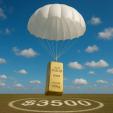Euro Falls as More ECB Easing Seen as Near-Certainty by Traders
Frankfurt (Mar 9) In the eyes of economists and traders, an extra splurge of monetary stimulus is all but certain at this week’s European Central Bank policy meeting, and in response the euro fell from the highest level in more than a week versus the dollar.
The shared currency dropped against 13 of its 16 major peers as swaps indicated that a 10 basis-point cut to the ECB’s minus 0.3 percent deposit rate is fully priced in for Thursday. And, nearly three-quarters of economists surveyed by Bloomberg expect the ECB to expand its monthly bond purchases at the gathering.
The reaction to the ECB’s Dec. 3 policy announcement shows what’s at stake. The euro surged by the most since 2009 that day after the extra stimulus President Mario Draghi unveiled fell short of what markets were expecting. The economy also demands action, with recent data suggesting manufacturing and services are slowing even after the central bank pumped about 720 billion euros ($794 billion) into the region.
“The market’s wish list for ECB measures is long, so the first question to ask is whether it can surprise at all,” said Valentin Marinov, head of Group-of-10 foreign-exchange strategy at Credit Agricole SA’s corporate and investment-banking unit in London. “The second question, therefore, is whether its decision can constitute a euro-negative outcome. We think that the answer to both questions should be yes.”
Euro Drops
The euro slipped 0.4 percent to $1.0965 as of 6:47 a.m. New York time, after touching $1.1058 on Tuesday, the highest level since Feb. 26. It fell for a third day against its Japanese counterpart, dropping 0.6 percent to 123.34 yen.
Traders are pricing in a 92 percent chance of the Frankfurt-based ECB lowering its deposit rate to minus 0.4 percent, and an 8 percent chance of a cut to minus 0.5 percent, according to data compiled by Bloomberg using swaps on the euro overnight index average. The calculation assumes that the gap between Eonia rates and the deposit rate remains in line with recent levels.
Negative interest rates reduce the appeal of holding euros, while extra quantitative easing expands the supply of the currency, which tends to weaken it. Both policies are taken with stoking economic growth and staving off deflation in mind.
Hedge Funds
Hedge funds and other speculative investors seem confident Draghi will expand stimulus. They raised net bearish positions in the euro by 17,495 contracts in the week ending March 1, the first addition since Dec. 29 and boosting them from a 1 1/2-year low of 28,185 in February, data from the Commodity Futures Trading Commission in Washington show.
Even so, currency investors should be prepared to be underwhelmed again, not least because the expectations for what Draghi will unveil on Thursday are so high, said Peter Rosenstreich, head of market strategy at Swissquote Bank SA in Gland, Switzerland.
“Despite a clear economic deterioration which demands a proactive strategy, Draghi and the ECB are working with limited tools,” said Rosenstreich. “And we are at the stage of micro tuning which is unlikely to overwhelm anyone.”
Source: Bloomberg










